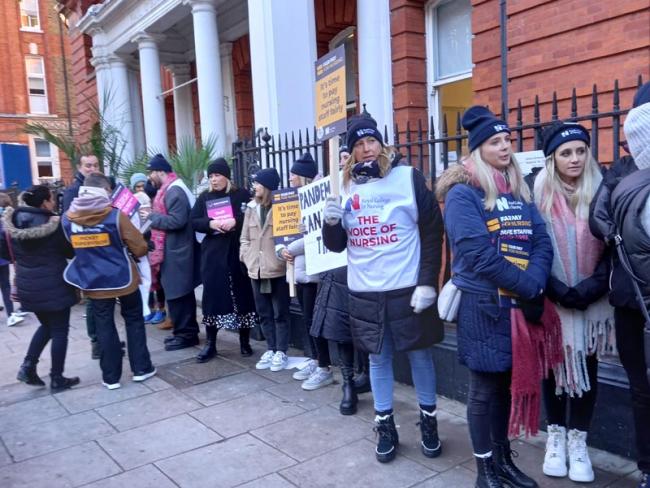
Nurses at Great Ormond Street Hospital, London. Photo Workers.
On 15 December nurses conducted the first-ever national strike in the 106-year history of the Royal College of Nursing (RCN). It was followed by a second strike day on 20 December. The government is so far unmoved and avoids meaningful negotiations.
RCN members formed well organised picket lines across England, Wales and Northern Ireland. Rather like a well-run ward, there was a picket line supervisor in a dark coloured tabard and other picket line members in their white tabards.
Each line had an attendant demonstration of support of up to 100 RCN members, including those who had come in from maternity leave. These were very youthful picket lines.
Before the strike Conservative Party chairman Nadhim Zahawi said their action was “exactly what Putin wants to see” – a statement met with widespread ridicule. Then they were briefing that the strike will cost lives, as if all was otherwise well with our health service.
The government sticks to the mantra of “we have followed the recommendation of the pay review body.” But as the Institute for Government points out, “‘The government is not bound by the review bodies’ recommendation. The prime minister and relevant secretaries of state decide how to react to the advice provided.”
At the end of the first day of action RCN general secretary Pat Cullen described it as a significant turning point for nurses, saying, “Ministers find themselves under fresh pressure from unexpected places – their own MPs, NHS leaders and a former chair of the Pay Review Body. Each of these groups, for different reasons, wants the government to stop hiding behind its current fig leaf.” One of those MPs was Steve Brine, newly elected chair of the parliamentary Health and Social Care Select Committee. He said that thinking again would be the “sensible” response.
One of the NHS leaders was Ruth May, Chief Nursing Officer for England, who went to support the picket line at St Thomas’ Hospital in London. Naturally the government tried to distance itself by saying that she did not represent them.
Cullen also noted that on a bitterly cold day, the public warmth towards nursing staff was immense. She said, “For my members, this has been about professional pride, not personal hardship – speaking up for nursing, patients and the future of the NHS.”
